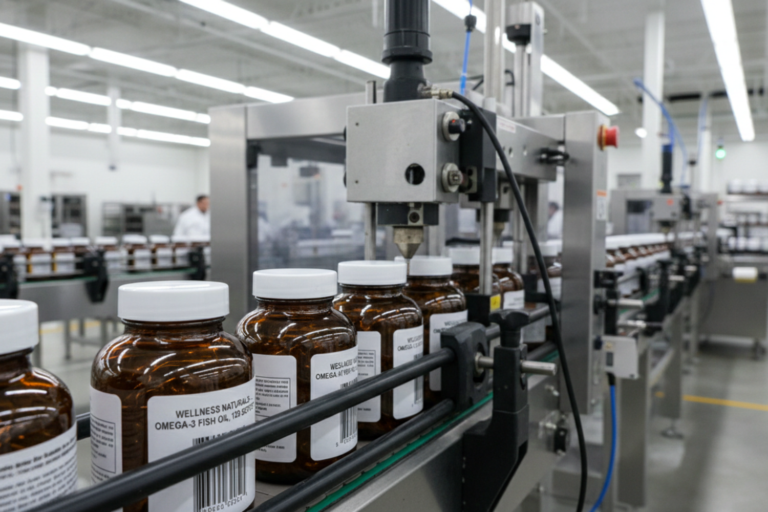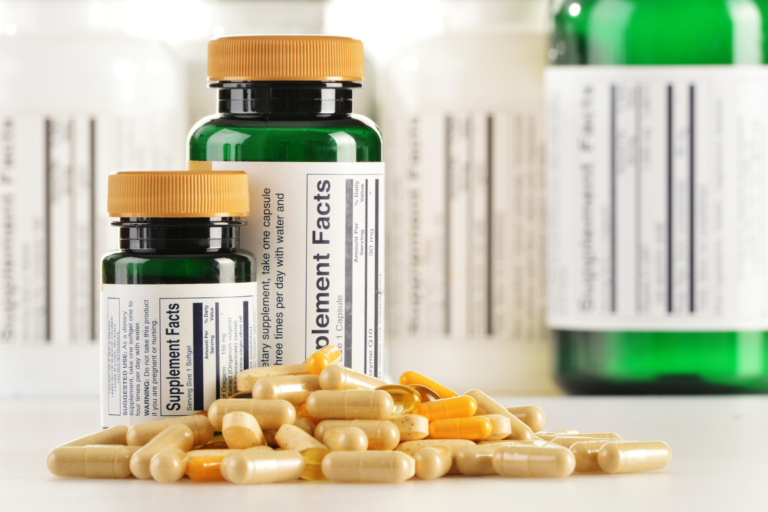Good Manufacturing Practices (GMP) are essential quality standards that ensure products, including dietary supplements, are consistently produced and controlled according to strict guidelines. In the supplement industry, GMP certification does not guarantee product safety, but rather, it ensures that processes are in place to help reduce risks of contamination and inconsistencies.
GMP is a process-focused certification, so it primarily ensures adherence to manufacturing standards rather than directly ensuring the safety or efficacy of the product. It sets high standards that protect consumers and meet regulatory requirements.
With GMP certification, manufacturers demonstrate compliance with regulatory authorities, improve quality management systems, and establish robust quality control, ultimately boosting trustworthiness and market competitiveness. This guide provides a comprehensive overview of the GMP certification process, its benefits, and the essential practices involved in supplement businesses.

What is Good Manufacturing Practices (GMP) Certification?
Good Manufacturing Practices (GMP) certification sets clear standards to ensure supplements are produced safely and meet high-quality standards. Under GMP guidelines, manufacturers follow strict protocols for sanitation, quality control, and precise documentation of each step in the manufacturing process. These measures are crucial for keeping facilities clean, maintaining high standards for equipment, and guaranteeing that each product meets specific quality requirements.
The primary purpose of GMP is to establish guidelines that help reduce the risk of contamination, mislabeling, and variations in product quality. By adhering to GMP regulations, manufacturers reduce the risks involved in supplement production, protecting consumers and ensuring that every product aligns with its intended use and quality standards. Detailed written procedures and quality checks play an important role in minimizing errors that could impact product quality and consumer satisfaction.
GMP certification indeed emphasizes the manufacturing process, but it requires that final products are tested to ensure they meet specifications, which may include some aspects of ingredients or product quality. Unlike certifications that verify ingredient sourcing or organic claims, GMP centers on every production stage, from starting materials to final packaging, ensuring a consistent approach to quality control and regulatory compliance.

Why GMP Certification is Essential for Supplement Businesses
GMP certification is beneficial for supplement businesses aiming to meet regulatory standards and maintain consistent product quality, which can help build consumer trust.
Regulatory Compliance
While GMP standards align with FDA regulations, certification is not a requirement for regulatory compliance under U.S. law for dietary supplements. The FDA mandates that dietary supplement manufacturers follow GMP guidelines, but obtaining a certification is voluntary and not required by the FDA.
However, it helps manufacturers avoid costly legal issues and ensures that products meet strict safety standards. With GMP certification, manufacturers can be confident they follow federal guidelines that protect consumers and satisfy regulatory authorities.
Quality Assurance
Quality assurance is another significant benefit of GMP certification, as it ensures that each batch of supplements is produced consistently to high standards. When they begin following documented proof of processes, businesses demonstrate their commitment to producing safe, high-quality products, which boosts consumer trust and confidence.
Increased Marketability
Finally, GMP certification can increase marketability by establishing a product’s credibility. With consumers seeking trustworthy and verified products, a GMP-certified label can help supplements stand out as safe and reliable choices.
Risk Mitigation
Achieving GMP certification can minimize risks associated with supplement manufacturing. GMP certification helps businesses:
- Reduce contamination risks: Strict GMP guidelines ensure proper sanitation and equipment maintenance, lowering the chance of contaminants entering products.
- Prevent costly recalls: By adhering to GMP standards, manufacturers can decrease the risk of quality issues that could lead to recalls, saving both money and reputation. However, while GMP standards help reduce the likelihood of quality issues, they cannot entirely prevent recalls. Recalls can still occur for reasons beyond manufacturing, such as ingredient sourcing issues or contamination post-production.
- Avoid legal disputes: GMP compliance reduces the risk of regulatory penalties or lawsuits, protecting businesses from legal and financial consequences.

Steps to Obtain GMP Certification for Your Supplement Business
1. Understand the Requirements of GMP Certification
To achieve GMP certification, your supplement business must meet several essential requirements, including having documented quality control processes, maintaining strict hygiene in all production areas, and ensuring accurate labeling and traceability. GMP guidelines also require detailed written procedures to monitor every stage of the manufacturing process, from raw materials to finished products.
For more in-depth information on these requirements, consult official resources, such as the FDA’s GMP guidelines, which provide comprehensive standards for Good Manufacturing Practices. Another valuable resource is the World Health Organization’s GMP guidelines, which can provide additional insights for supplement manufacturers.
2. Choose an Accredited GMP Certifying Organization
Selecting the proper certifying organization is essential to ensuring your GMP certification is reputable and recognized. Here are three widely respected certifying bodies:
- NSF International: A global leader in GMP certification for dietary supplements.
- Natural Products Association (NPA): Provides GMP certification specifically for dietary supplements and natural products.
- UL (Underwriters Laboratories): Offers GMP certification services focusing on safety and compliance.
When choosing a certifying body, consider factors such as cost, reputation, and expertise in the supplement industry. Selecting an organization with experience in dietary supplements can offer added assurance that their GMP certification aligns with industry standards and regulatory expectations.
3. Prepare Your Facility and Staff
Establishing robust processes is crucial to GMP compliance. Implement clear quality control protocols, maintain thorough documentation of each production step, and ensure all hygiene practices align with GMP guidelines. This structured approach minimizes errors and ensures every supplement meets quality standards.
Training employees on GMP standards is equally important. Staff should understand the significance of GMP compliance and be equipped to follow proper practices in their daily tasks. This includes adhering to sanitation standards, documenting procedures, and participating in quality control.
4. Conduct a Pre-Audit (Optional but Recommended)
A pre-audit is an optional but highly beneficial step that can help identify any areas where your facility might fall short of GMP standards. Conducting a pre-audit allows you to:
- Spot and address potential gaps in your processes.
- Ensure documentation meets GMP requirements.
- Verify that equipment and facilities are up to standard.
- Assess employee adherence to hygiene practices.
- Confirm that quality control measures are consistent and well-documented.
If you’re new to the GMP certification process, consider hiring a GMP consultant. A consultant can guide you through the steps, help with documentation, and ensure you’re fully prepared, minimizing the risk of costly mistakes during the official audit.
5. Schedule and Undergo the GMP Certification Audit
When your facility is ready, schedule the official GMP audit with your chosen certifying organization. During this audit, representatives will inspect your facility, review quality management systems, and assess your overall compliance with GMP regulations.
Auditors commonly focus on several key areas during the inspection:
- Cleanliness: Ensuring all areas and equipment are maintained to prevent contamination.
- Process Consistency: Verifying that manufacturing processes follow documented procedures.
- Record-Keeping: Checking that all steps are thoroughly documented to provide traceability.
6. Maintain Compliance and Renew Certification Regularly
After receiving GMP certification, ongoing compliance is essential. Regularly review and update your processes to ensure they continue to meet GMP standards, especially if there are changes to equipment, staff, or production methods. This proactive approach helps prevent issues that could arise during future inspections.
GMP certification isn’t permanent; it requires periodic renewal, which may include follow-up audits to confirm continued compliance. But remember that not all certifying bodies require periodic renewal for GMP certification. The frequency and necessity of follow-up audits can vary based on the certifying organization’s policies, and some certifications may not have a standardized renewal requirement. Staying current with GMP guidelines and preparing for renewal audits will help you maintain your certification and continue delivering high-quality, safe supplements to customers.

Key Benefits of GMP Certification for Supplement Businesses
Builds Trust with Customers
GMP certification can certainly enhance reputation, as it signals a commitment to producing high-quality, safe products. When customers see a GMP-certified label, they understand that the business follows strict standards to ensure consistency and safety.
This assurance can attract new consumers and enhance the brand’s image in a competitive market. But it’s also worth noting that some consumers may not recognize GMP certification as it is more focused on industry standards than consumer-facing labels like “organic” or “non-GMO.”
In addition to enhancing brand reputation, GMP certification can foster long-term customer loyalty. Consumers are likelier to stay loyal to brands they trust, especially in the health and wellness industry, where product safety is essential. GMP-certified supplements signal a commitment to quality standards, which can enhance customer confidence and support brand loyalty.
Helps Avoid Regulatory Issues
One significant advantage of GMP certification is compliance with FDA requirements. GMP-certified businesses follow detailed protocols and quality management systems, which can help them be prepared for FDA inspections. Meeting these standards reduces the chances of facing penalties, ensuring smoother operations and regulatory peace of mind.
GMP certification also reduces the risk of costly product recalls. It also supports standardized manufacturing practices that can help minimize the risk of contamination or production errors. This minimizes the chance of quality issues reaching the consumer, which may help reduce the chances of contamination or quality issues and protect the brand’s reputation.
Streamlines Production and Quality Control
Standardized processes under GMP certification streamline production and quality control, reducing errors and improving consistency across all batches. Following GMP guidelines allows manufacturers to establish clear steps for each part of the production process, leading to higher-quality products and smoother operations.
Although GMP certification requires an initial investment, it can save costs over time. Businesses can save money and resources by reducing rework, recalls, and regulatory fines. Over the long term, a certified system leads to a well-organized, cost-effective production process, helping supplement businesses maintain quality while managing operational expenses effectively.
Common Challenges in Achieving GMP Certification and How to Overcome Them
High Initial Costs
The initial costs of obtaining GMP certification can be high, especially for small businesses. However, these costs can be managed effectively with careful planning and strategic spending. Here are some strategies:
- Set up a detailed budget to plan for each phase of the certification process, focusing on critical areas first.
- Prioritize key GMP areas like sanitation and quality control, which are essential for compliance and often offer the highest return on investment.
- Consider hiring a GMP consultant to streamline processes and avoid costly mistakes, which can help reduce expenses in the long run.
Implementing New Systems and Processes
Meeting GMP standards often requires implementing new systems and processes, which can initially feel overwhelming. To ease the transition, create a step-by-step plan that begins with foundational areas, such as sanitation practices and detailed documentation. Gradually building up these processes allows businesses to meet GMP requirements without causing too much disruption.
Staff Training and Compliance
Ensuring all staff members understand and follow GMP requirements is another common challenge. Staff training and engagement are essential for maintaining compliance. Here’s how to tackle this:
- Develop ongoing training programs that cover GMP basics and specific processes relevant to each team.
- Communicate clearly why GMP compliance matters and what each employee’s role is in achieving it.
- Encourage engagement by regularly updating staff on GMP changes and improvements to keep them informed and motivated.
Frequently Asked Questions
How much does GMP certification cost?
GMP certification costs vary widely, typically ranging from a few thousand to tens of thousands of dollars, depending on the business’s size, location, and chosen certifying body.
How long does it take to get GMP certified?
On average, GMP certification takes 3–6 months, though timelines depend on the facility’s size, readiness, and the certifying organization’s process.
Can a small business get GMP certified?
Yes, small businesses can achieve GMP certification and may benefit from a simplified, phased approach to gradually meeting requirements.
Is GMP certification mandatory for supplement businesses?
GMP certification is not legally mandatory for supplements but is highly recommended for quality, safety, and regulatory compliance.
What happens during a GMP audit?
During a GMP audit, an inspector evaluates the facility’s cleanliness, documentation, and quality control systems to ensure compliance with GMP standards.
Start Your GMP Certification Journey Today
Achieving GMP certification is crucial in building a reputable and trusted supplement business. Meeting GMP standards ensures businesses have high product quality and regulatory compliance and strengthens customer confidence and loyalty. The first steps toward certification can help set your brand apart in a competitive market.
To get started, consider visiting certifying body websites, scheduling a consultation, or contacting industry experts for guidance on the certification process. Begin your journey to GMP certification today and invest in your supplement brand’s long-term success and reliability.
References
- National Institutes of Health, Office of Dietary Supplements. (n.d.). Dietary supplement label database (DSLD). Retrieved from https://ods.od.nih.gov/Research/Dietary_Supplement_Label_Database.aspx
- U.S. Food and Drug Administration. (2017). Backgrounder on the Final Rule for Current Good Manufacturing Practices (CGMPs) for Dietary Supplements. Retrieved from https://www.fda.gov/food/dietary-supplements-guidance-documents-regulatory-information/backgrounder-final-rule-current-good-manufacturing-practices-cgmps-dietary-supplements
- U.S. Food and Drug Administration. (n.d.). Current Good Manufacturing Practice (CGMP) Regulations. Retrieved from https://www.fda.gov/drugs/pharmaceutical-quality-resources/current-good-manufacturing-practice-cgmp-regulations
- U.S. Food and Drug Administration. (2024).Dietary Supplements Guidance Documents & Regulatory Information. Retrieved from https://www.fda.gov/food/guidance-documents-regulatory-information-topic-food-and-dietary-supplements/dietary-supplements-guidance-documents-regulatory-information
- U.S. Food and Drug Administration. (2024). Facts about current good manufacturing practice (CGMP). U.S. Food and Drug Administration. Retrieved from https://www.fda.gov/drugs/pharmaceutical-quality-resources/facts-about-current-good-manufacturing-practice-cgmp
- U.S. Food and Drug Administration. (2024). Pharmaceutical quality resources. Retrieved from https://www.fda.gov/drugs/development-approval-process-drugs/pharmaceutical-quality-resources
- World Health Organization. (n.d.). Good manufacturing practices (GMP). World Health Organization. Retrieved [date], from https://www.who.int/teams/health-product-policy-and-standards/standards-and-specifications/norms-and-standards/gmp





